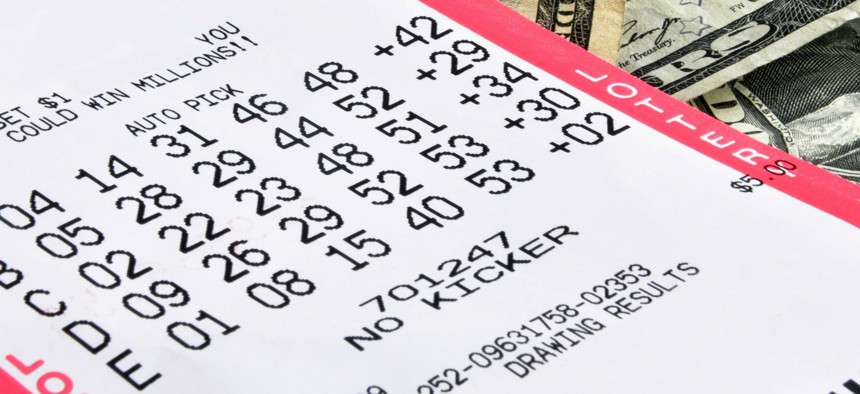Connecting state and local government leaders
There’s a new program to promote “responsible gambling” amid ongoing criticism that lotteries prey on the poor.
State lotteries, for years accused of preying on the poor, have just begun a program to improve their image with steps to help people seen as “problem gamblers.”
The program was unveiled last month by the North American Association of State and Provincial Lotteries along with a partner, the industry-supported National Council on Problem Gambling. It will create a system for determining whether lotteries are running “responsible gambling programs” and offer help to those that want to improve their efforts.
Four state lotteries have been asked to participate in a pilot of the “verification” program, and once they have completed certification early next year, it will be rolled out to serve other lotteries in the 43 states and the District of Columbia that sanction lotteries.
Heretofore, states have had little incentive to question their lotteries’ performance or their societal effects. As The Pew Charitable Trusts’ Stateline reported last year, U.S. lotteries’ sales in 2014 topped $70 billion, generating billions of dollars to support state budgets.
Stateline’s article noted that expansion of the lotteries has brought more criticism “that lotteries have grown so big they’re preying on problem gamblers and worsening some of the social ills—poverty, homelessness, and more—they were designed to address through new revenue.”
Critics would like to see more regulation, more treatment of addicts, and, in some cases, the outright abolishment of the lotteries. Some see them as bordering on immoral: Alabama, Mississippi and Utah have rejected lotteries, citing religious objections. For other reasons, Nevada, Alaska and Hawaii also have chosen not to institute lotteries.
Hope for the Hopeless?
An extensive study of the Maine State Lottery by the Maine Center for Public Interest Reporting was published last month on the center’s website and in newspapers like The Ellsworth American and The Mount Desert Islander. The center’s three-part series relies on a careful academic study of lottery sales patterns to support its conclusion that the poor are willing victims of the lottery, and that the state is selling “Hope to the Hopeless,” as the series’ tagline declares.
Exhaustively reported by David Sherwood of the non-profit research center, the series begins in a tiny convenience store in the town of Waite. It’s owned by former selectman Wayne Seidl, who balks at selling lottery tickets to a woman whose family is down-and-out. But Seidl knows his is a futile stance: “If they don’t get them here, they’ll go somewhere else,” he saidreads. Regular buyers, he adds, are unemployed and on food stamps or welfare.
Sherwood cites the study of lottery sales and economic data performed at the center’s request by David R. Just, professor and director of graduate studies in the Charles H. Dyson School of Applied Economics and Management at Cornell University. A key finding: “[F]or every one percent increase in joblessness in a given ZIP code, sales of scratch and draw tickets jump 10 percent.” Sherwood summarizes other conclusion he reaches in his investigation:
- Maine’s poorest towns spend as much as 200 times more per person than those in wealthier areas, according to the data. “You’re selling to people who are already desperate, or in tough financial circumstances,” said . . . Just. “By promoting the lottery, the state is, in some way, complicit in this.”
- Since 2003, the state-run lottery has more than tripled its advertising budget, invested in sophisticated market research to better target new customers and installed flat-screen TVs in stores to encourage impulse buys, according to interviews and documents obtained by an open records request.
- Because the lottery pays for itself, the legislature exerts virtually no oversight over the process. “They basically run their own business,” said state Rep. Louis Luchini, D-Ellsworth, co-chair of the committee that oversees the lottery.
- Despite promoting the lottery over decades, the state has never studied its impact on the lives and finances of the poor and unemployed, who spend disproportionately on the lottery. State lottery and health officials interviewed said they had no data on addiction rates and had no plans or funding to gather it.
- Total sales of lottery tickets—about $230 million—is more than what Mainers spend every year on liquor and also more than the revenue generated from Maine’s corporate income tax. The lottery transfers an average of $50 million per year of the $230 million to the General Fund, the state’s primary operating budget, money that would otherwise need to come from cutting state services or raising taxes—making calls for more stringent oversight unpopular, legislators said. (The balance of the $230 million is paid out in winnings and used to administer and promote the lottery.)
The $50 million amounts to about 1.5 percent of the state’s General Fund revenues.
As in other states, Maine puts a happy face on its offerings. The Maine State Liquor and Lottery Commission’s website declares:
The Maine State Lottery offers fun and exciting lottery draw games including Tri-State Megabucks, Powerball, Mega Millions, Hot Lotto, Lucky for Life, Tri-State Pick 3 and Pick 4 and Tri-State Gimme5 as well as an extensive array of instant scratch lottery tickets.
Maine’s lottery now spends $3.5 million a year to promote sales of these offerings. In 2014, it hired a Boston-based advertising agency, Fuseidas, to improve the image of the lottery by casting it as part of a “healthy entertainment mix” and to boost sales with a wide variety of techniques. The firm had helped increase lottery sales in Connecticut by $41 million and in Massachusetts by $102 million, according to its CEO Dennis Franczak.
Lottery sales have rebounded in Maine since the Great Recession, and Scientific Games Corp., which operates the lottery under contract, told an April meeting of lottery officials that “other states are looking to see how we are having so much success with draw games and the promotions that are being done.”
Ethical Concerns
The headline over Sherwood’s third article declares: “Drunk on lottery’s millions, Maine asks no questions about ethics of state-run gambling.”
“The state is drunk on the revenue,” former Republican legislator Peter Mills told Sherwood.
“The political backdrop is, no one cares about these people. They have no constituency. The fact that this money should be spent on groceries for their children doesn’t seem to matter.”
The state makes a few half-hearted gestures toward dealing with problem gamblers. The Maine Lottery’s logo carries this message: “Keep it Fun. Play Responsibly.” And its website includes a list of 21 questions to help people see if they have a “gambling problem.”
Maine’s Department of Health and Human Services’ Office of Substance Abuse and Mental Health Services spends $100,000 a year on problem gambling (but all of the money is donated by the state’s two casinos, and so the lottery takes a back seat).
Also apparently on the scene is the Maine Council on Problem Gambling, but its website has no information on council members, offices or programs, and simply notes that the council “is being rejuvenated to meet the needs of a currently underserved population of Maine residents.”
Ethics concerns have been raised in many states, and many have sought to address some of the concerns by earmarking lottery revenues for education or other worthy causes. (Maine’s lottery’s $50 million contribution goes into the state’s general fund.) This has helped states deflect the recurring charge that lotteries can act as a regressive tax on the poor—substituting their revenues for monies that would otherwise be raised by more progressive taxation.
North Carolina offers one example.

The state, long considered part of the Bible Belt, was the last on the East Coast to establish a lottery, and it did so in 2005 by the slimmest of margins, with the lieutenant governor breaking a 24-24 tie in the state Senate. It is called the North Carolina Education Lottery, and all of its subventions to the state budget—$530 million next year—are earmarked for educational programs.
The lottery will sell about $2 billion in tickets in 2016.
North Carolina Education Lottery Director Alice Garland has watched as the lottery’s original ambition—to provide a significant supplement to existing state education funding—has eroded.

“As the state’s budget got tighter with the recession, the lottery funds really started to replace existing dollars,” she said in an interview. As the state has cut taxes, and witnessed educational demand increase with population growth and influx of needy students, lottery money has been increasingly been substituting for other state revenues, though not in sufficient amounts to prevent service reductions.
Still, Garland said about 40 percent of the $530 million still constitutes new money in the state’s educational system. Some of it goes to build new schools. Some of it is earmarked for scholarships going to needy students at North Carolina colleges and universities. And some goes to fund pre-kindergarten schooling for four-year-olds—maintaining the lottery program’s early success in doubling the number of kids attending.
But the lottery remains controversial among North Carolinians who believe that its funds should have been sufficient to avoid teacher layoffs in recent years.Garland has become a leader in the movement to have lotteries pay attention to problem gamblers, and she chairs the national lottery association’s Responsible Gambling Committee.
“I just think it’s the right to do,” she said. “I tell our staff that we can be successful without sales to people who can’t afford it, and who are problem gamblers.”
North Carolina’s lottery contributes $1 million a year to fund gambling addiction remedy programs run by the North Carolina Health and Human Services Department. Garland approached casino operators to contribute, but without success so far. Nor, she observes, do owners of online poker operations kick into the fund.
Protecting the Business
Lotteries are big businesses, and they operate with business techniques and objectives.Thus the website of the National Association of State and Provincial Lotteries declares: “As this industry looks towards the future of Lottery, it is apparent that as a whole, it must continue to protect its market share, profits, and products.” And the association looks to vendors to supplement its dues: It offers four categories of “Associate Memberships” at levels of $175,000, $100,000, $35,000 and $5,000.Improving its image is one of the industry’s objectives, as criticism grows.
Private sector gaming companies have long recognized the challenge, having acted in 1996 to establish the National Center for Responsible Gaming. Executive director, Keith Whyte, praises the association’s new program. “For the first time a segment of the U.S. gambling industry has adopted a responsible gaming framework and independent verification process,” he said in an announcement of the program.
“We congratulate NASPL members for their recognition of problem gambling and their embrace of responsible gaming.”
Garland, who chairs the NASPL’s Responsible Gambling Committee, explained that the new initiative is modeled after a problem-gambling certification program begun years ago by the World Lottery Association. Nineteen U.S. state lotteries are members of the world association, but only some have applied for certification.
The program will offer lotteries three categories of “verification.” The first is for those that have not yet developed “robust” programs. By filing an application with the association, these lotteries will gain advice from experts on how to develop acceptable programs.
The second category is for states with ongoing programs; and the third is a program of periodic review, once every three years, to “ensure ongoing performance.”
The association’s announcement said an assessment panel would review applications in eight categories: research, employee training, retailer training, player education, new/existing product oversight, budget, advertising and engagement/awareness.
The association has approached four lotteries to pilot the program. None so far has filed an application detailing the nature of its current responsible gambling programs, Garland said. The hope is that the applications for pilot verifications will be filed by January. Once a team assembled by the two U.S. gambling groups has completed verification, the identity of the four lotteries and the details of their programs will be unveiled. A condition of participation is that these and other participating lotteries must declare their willingness to help other state lotteries stand up their own programs.
Most U.S. lotteries will fall into the first category, Garland said, inasmuch as few have undertaken robust efforts to address problem gambling. But it is likely that as the program gets under way, many will see the advantages of getting out ahead of their critics by addressing a key vulnerability in the lotteries’ image with the public. Their initiatives will seek to counter critics like Just, who wonders “why in the world” a state would be pushing lottery programs “that are clearly addictive,” and serve to redistribute income “the wrong way,” as he said in an interview.
And they’ll be working to avoid editorials like one titled “Lottery Lights Out” published Nov. 6 in the Mount Desert Islander. “Maine never should have gotten into the lottery business,” the editorial said. “It’s high time that it got out.”
Correction: This story has been updated with the correct name of the program established by private sector gaming companies in 1996, the National Center for Responsible Gaming.
Timothy B. Clark is Editor at Large at Government Executive’s Route Fifty.

NEXT STORY: Alaska’s Gloomy Economic News; Flint Water Crisis Lawsuit Looms




